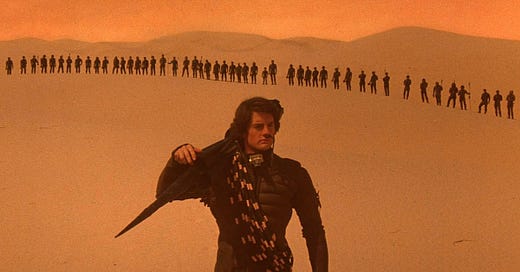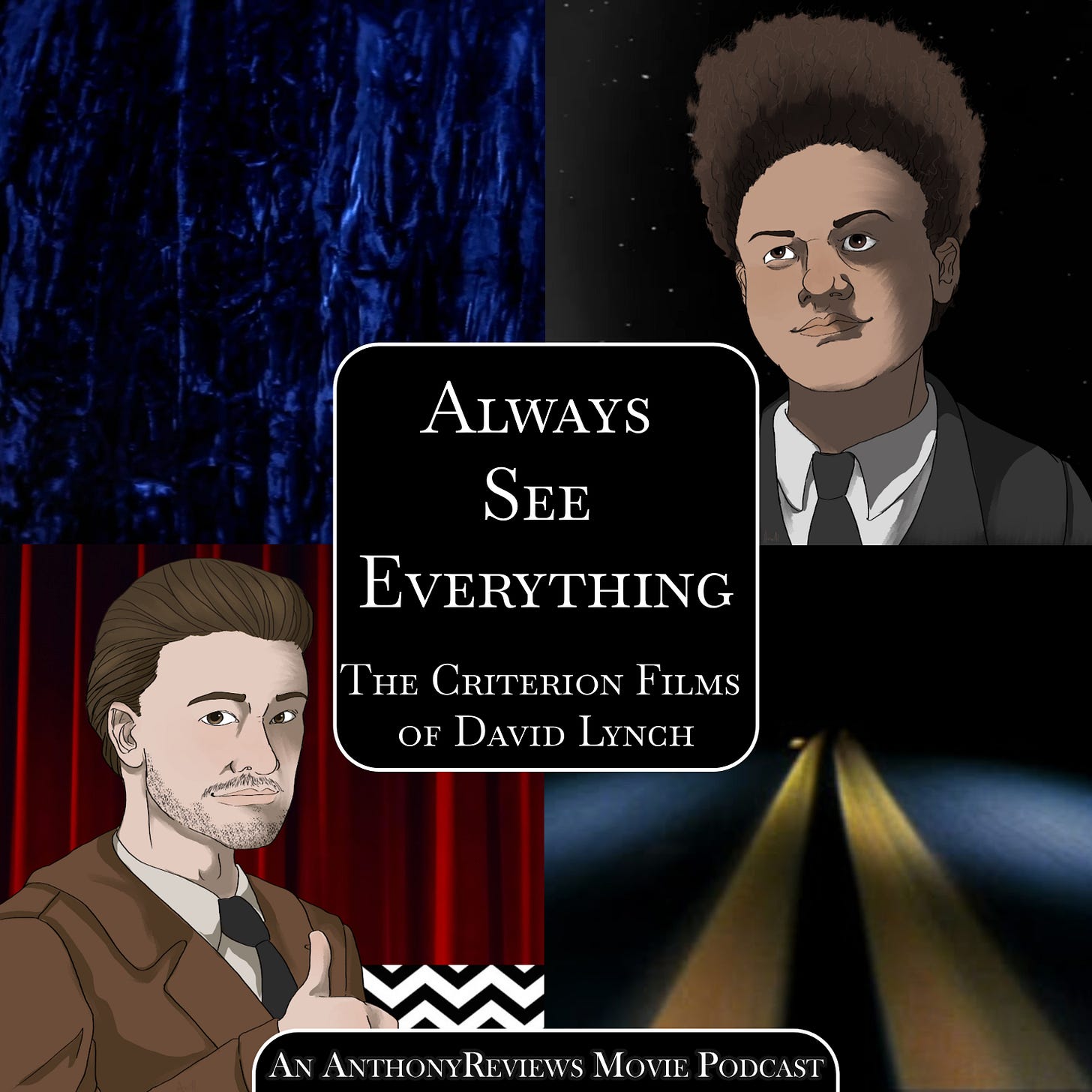David Lynch's 'Dune' Review: There's a Lot to Love I Swear
We're getting Lynchian up in here for the next few months [11/15/2024].
My podcast Always See Everything is currently going through every film from master director David Lynch in the Criterion Collection. This is a bit of a challenge to me, who had up to now not connected well with any of his work that I’d seen. To coincide with that miniseries, I’ve decided to give short reviews of the 3 films of Lynch’s that are outside the Collection: Dune, Wild At Heart, and The Straight Story. My takes could be appreciative or controversial, so subscribe so you don’t miss a single review!
David Lynch’s Dune is Broken But Charming
Perhaps it is the charm of a bygone blockbuster era so unlike our own, but I did not mind watching David Lynch's Dune. The 1984 critical and financial flop retains the silliness of its era's blockbusters. Made after Lynch rejected an offer to direct, of all things, Return of the Jedi, Dune is a complex web that did not make sense to the simplistic audiences of the Chosen One Star Wars narrative. A few adaptations later, I found looking back at the deeply flawed picture a delightful experience, unworthy of the bile thrown at it by even deep David Lynch fans.
This could be because, unlike many viewers at the time, I was familiar with the story already. Most are familiar with the story through its telling by Denis Villenueve's films, which split the story into two parts, unlike Lynch’s singular cramped film. A battle between royalty over the planet Arrakis for its resources crests when the banished inheritor Paul (Kyle McGlaughlin) learns about the planet's natives and becomes their messiah to win back his birthright. It’s an epic that questions our motivations in rooting for Paul and his family in light of their taking advantage of other cultures. The fight over spice, the planet’s main export, is a metaphor for any colonial oppression and exploitation while bringing in religious interrogation, political intrigue, and a dash of coming-of-age hallmarks.
The main issue with Dune (1984) is what feels should be the middle part of the story where Paul convinces the Freman, Arrakis’ inhabitants, that he is their prophecied Messiah. It is here that Paul restrengthens and trains to win back his domain, and where the allegories for religious and colonial manipulation really thrive. But Lynch’s Dune decides the film should take place over about fifteen minutes of screen time in a haphazard montage. His rapid acceptance into a society he is not a part of is destructive to the film's themes and tensions. But let's be honest; most viewers would be checked out far before then, either because they are a David Lynch fan… or, just as likely, because they are not.
There just isn’t any getting around the fact that, for an 80s sci-fi epic, the film is incredibly odd and off-kilter. At the jump, there’s the film’s narrator, a floating head of a space princess barely consequential to this adaptation. The following scene features the fantastic but horrific puppet of a Guild Navigator with vaginal imagery for a mouth. That’s all before we’ve even set down on a planet! Viewers at the time must have realized quickly that they were in a galaxy even farther away than they were used to. For Lynchheads, the bizarro moments are actually a cool glass of water in Arrakis’ dry conventions. Lynch is an oddly shaped peg crammed into as square of a hole as possible. He’s a surrealist who chose film as a medium because he wanted to see paintings move, not a blockbuster filmmaker who loves movies because he saw Star Wars. Some moments are off-kilter in that way Lynch fans love, but they’re scattered tinsel hung around a complex Christmas tree network. The ornaments are pretty but what is up with that tree?
The near-impenetrable plot may be tough enough without Lynch adding his dreaminess, but scale and beauty win out when you already know the story. For those seeking the strange and raw truth held within paintings, Dune fairs well. I would recommend knowing the story of Dune from the novel or Villeneuve adaptation first so that when Sting shows up in a codpiece you understand why. Bits of loving craft, like Brain Eno’s theme for the film, the special effects of epic proportions on the Dune worms, and Patrick Stuart’s audition for Picard in his role as Gurney make this a worthwhile watch. If you’re willing to see Lynch freestyle, Dune will just satisfy, but in an attempt to be both a blockbuster and a Lynch movie, you will find the film comes up short.
3/5⭐
The David Lynch Podcast Miniseries
For the next few weeks, my podcast will be covering the films of David Lynch to see whether or not I come around to liking the director. Our episode on his first feature Eraserhead is out now, so listen and subscribe below to keep up!








great review - and without wanting to defend any of the movie’s many shortcomings, I’d note that Lynch admittedly didn’t have full creative control.
now a Lynch-cut might’ve been even “weirder” of course 😅